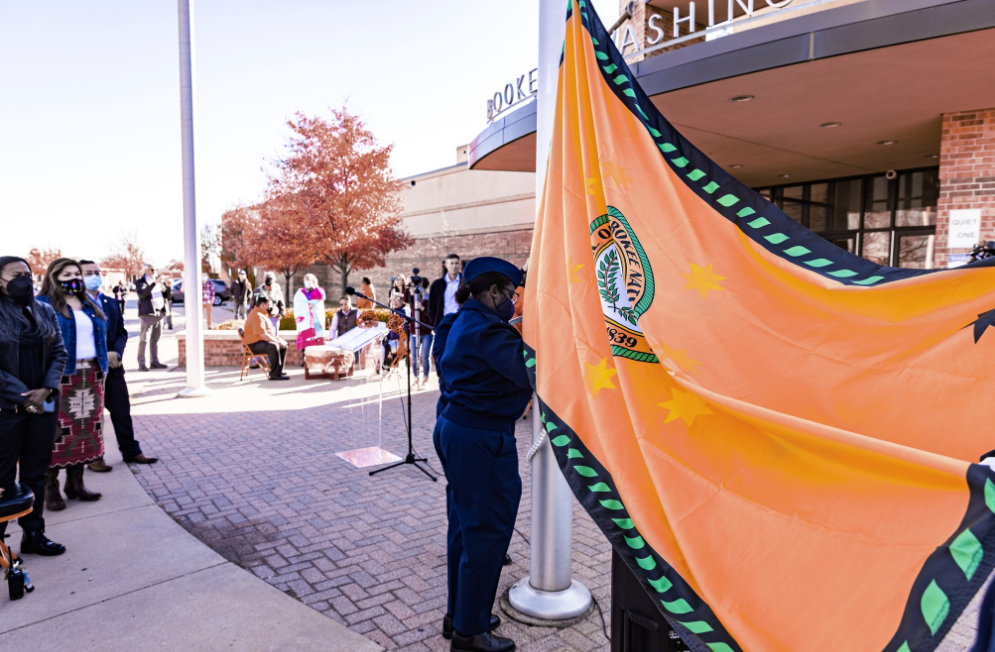
- Details
- By Chuck Hoskin Jr
Guest Opinion. Recently, I joined students, teachers and school leaders at Booker T. Washington High School in Tulsa to raise the Cherokee Nation flag over the campus for the first time. Going forward, it will fly every day next to the Oklahoma and American flags. It joins flags of the Osage Nation and Muscogee Nation that were raised at Tulsa Public School locations on the reservations of those tribes.
This new place of honor for the Cherokee flag helps remind students that they are receiving their education on Cherokee Nation reservation lands. I am proud that our reservation is home to this historic school that is a beacon of excellent education in our region.
Want more Native News? Get the free daily newsletter today.
The flag raising and land acknowledgment by Booker T. Washington students were a powerful way to conclude Native American Heritage Month. Across Oklahoma, students need a deeper understanding of where they live and the history of that community. It’s important that they learn more about the culture and history of Cherokee Nation here on the Cherokee Nation Reservation.
Tulsa Public Schools is currently reviewing its curriculum, as quality school systems do. We hope it includes efforts to teach more Native history -- and most importantly, accurate history. Just as important as knowing the history, students should understand how their day-to-day lives are greatly impacted by tribal nations, now and in the future.

A flag ceremony to recognize tribal land is symbolic, but when it comes with positive action and change, it can be profoundly important. It creates a greater sense of pride and belonging for Cherokee and other Native students as they enter and exit their school. It proudly acknowledges that we are visible and valued contributors to their school and community.
I appreciate the respect Tulsa Public Schools has shown to our tribal nations, and I admire the leadership Tulsa Public Schools has demonstrated during the COVID-19 pandemic. The partnership between Cherokee Nation and Tulsa Public Schools is strong and growing stronger.
My administration continues to make historic investments in public education. Cherokee Nation contributed $1.3 million from car tag revenues to Tulsa Public Schools this year, out of $6.3 million to schools across northeast Oklahoma.
We contribute every year because public education is essential, but this year was especially needed as we experienced the worst public health crisis in generations. When it comes to public education, the city of Tulsa and the state of Oklahoma have no better friends and collaborators than the Cherokee Nation. We’ll be there with you in the good times and tough times.
Cherokee Nation has always prioritized education. We created the first public school system on the reservation in 1841 and operated 18 public schools by 1843. We carry on that tradition today. I look forward to seeing the Cherokee Nation flag on the Booker T. Washington campus for many years to come, and I am excited for the next generation of leaders coming out of Tulsa schools with a greater appreciation of the tribes that share this land.
Chuck Hoskin, Jr. is the principal chief of the Cherokee Nation.
More Stories Like This
The SAVE America Act Threatens Native Voting Rights — We Must Fight BackThe Presidential Election of 1789
Cherokee Nation: Telling the Full Story During Black History Month
Jesse Jackson Changed Politics for the Better
Native News Online at 15: Humble Beginnings, Unwavering Mission
Help us defend tribal sovereignty.
At Native News Online, our mission is rooted in telling the stories that strengthen sovereignty and uplift Indigenous voices — not just at year’s end, but every single day.
Because of your generosity last year, we were able to keep our reporters on the ground in tribal communities, at national gatherings and in the halls of Congress — covering the issues that matter most to Indian Country: sovereignty, culture, education, health and economic opportunity.
That support sustained us through a tough year in 2025. Now, as we look to the year ahead, we need your help right now to ensure warrior journalism remains strong — reporting that defends tribal sovereignty, amplifies Native truth, and holds power accountable.
 The stakes couldn't be higher. Your support keeps Native voices heard, Native stories told and Native sovereignty defended.
The stakes couldn't be higher. Your support keeps Native voices heard, Native stories told and Native sovereignty defended.
Stand with Warrior Journalism today.
Levi Rickert (Potawatomi), Editor & Publisher
